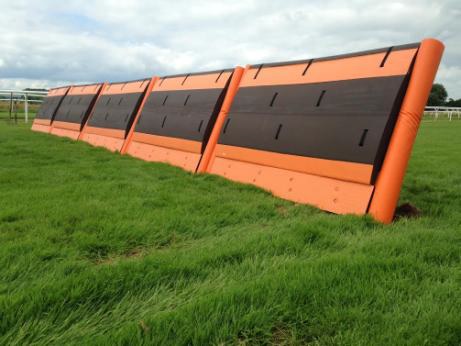Two further racecourses, Kelso on 14 September and Exeter 6 October, are the latest to join the extended trial of the ‘One Fit’ Padded Hurdle, joining Newton Abbot, Taunton, Bangor-on-Dee and Uttoxeter in using the enhanced hurdle design which is safer for both horse and rider.
The ‘One Fit’ design is a modified hurdle frame with a custom fitting close-cell foam pad replacing the traditional birch. The hurdle was developed by the BHA’s Senior Inspector of Courses Richard Linley, in consultation with relevant industry bodies, with the objective of reducing both the faller rate and the risk of injury as the result of a fall.
 The BHA launched a trial of the new hurdle at Newton Abbot in 2013 and the design has subsequently been rolled out to further courses in order to collate data about the impact that the new design has on safety of both horse and rider, and gather participant feedback. Since the inception of the trials, refinements have been made to the shape of the pad and the hurdle frame based on this data and the feedback received.
The BHA launched a trial of the new hurdle at Newton Abbot in 2013 and the design has subsequently been rolled out to further courses in order to collate data about the impact that the new design has on safety of both horse and rider, and gather participant feedback. Since the inception of the trials, refinements have been made to the shape of the pad and the hurdle frame based on this data and the feedback received.
The faller rate over the hurdles since the trial began in June 2013 has reduced to 1.59 per cent (56 fallers from 3,525 runners), which represents a reduction of 0.5 per cent compared to the ten-year average number of fallers across all hurdles. This would represent a reduction of around 90-100 less fallers on average each year if the hurdles were to be rolled out across all British courses.
The expanded trial will enable the BHA to compile further data regarding the impact of the hurdles. The extension of the trial also follows positive feedback from racecourses, veterinary surgeons, jockeys and the Professional Jockeys Association (PJA) and the National Trainers Federation (NTF), and was a recommendation of the recent Jump Review.
Richard Linley, Senior Inspector of Courses at the BHA, said:
“The statistics so far have been very encouraging in terms of safeguarding horse and rider welfare. Fewer fallers means safer racing, and the design of the hurdle means that when there is a fall the risk of injury to horse and rider is reduced. There have also been benefits for the racecourses taking part in the trial with less hurdle breakages occurring to the padded design. We would hope the trends continue in this positive manner.”
Jamie Stier, Director of Raceday Operation and Regulation for the BHA, said:
“The welfare of our participants is the number one priority for the BHA. We are always looking at ways to improve safety for both horse and rider, and the indications are that the One Fit padded hurdle is having a positive impact. Since the trial began three years ago the padded hurdle has produced faller rates that are lower than the national average on all of the racecourses included in the trial. The further expansion of the trial to incorporate a total of six racecourses is important as it will allow us to expand the data and gain further understanding of how the hurdle performs at numerous racecourses under different conditions.”
Anthea Morshead, Clerk of the Course at Kelso, said:
“Kelso Racecourse is delighted to be included in the extension of the trial of the new padded hurdles into the north. I have been very impressed by the statistical evidences regarding fallers and particularly the decreased number of injuries. The hurdle pad fits tight into the frame of the hurdle, and prevents the top bar being kicked out leaving the wooden spars of the frame exposed for horses following behind. It is an obvious development on from the padded legs and top rails that we currently use, and any improvement in horse welfare has to be a step in the right direction. A bonus for our ground staff is that the pads are light and easier to apply to the frame than threading hurdles with birch, and trials so far have resulted in less breakages.”
Barry Johnson, Clerk of the Course at Exeter Racecourse, said:
“Exeter are pleased to be the first Jockey Club Racecourse to try the ‘One Fit’ Padded Hurdle. We are positioned between Newton Abbot and Taunton and have been keeping a close eye on the trials that have been taking place. Less fallers, less injuries, less damage and easier to work with seems to be the main feedback. The trials seem to have gone very well and we now look forward to using the ‘One Fit’ Padded Hurdles ourselves and sharing the information gained over the next 12 months.”
Notes to Editors
1. The ‘One Fit’ Padded Hurdle trial so far has been implemented at:
Newton Abbot – from 30 March 2013
Taunton – from 29 October 2014
Bangor-on-Dee – from 29 July 2016
Uttoxeter – from 7 September 2016
Kelso – from 14 September 2016
Exeter – from 6 October 2016
